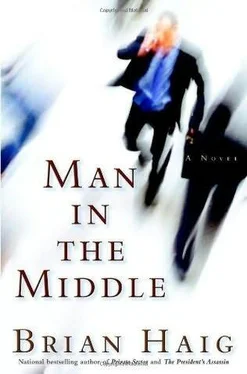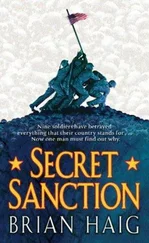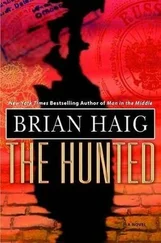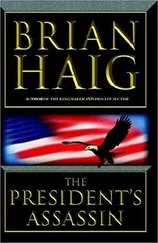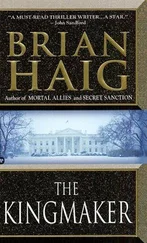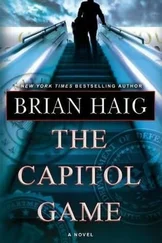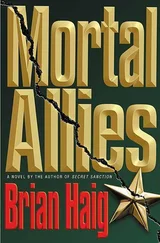Brian Haig - Man in the middle
Здесь есть возможность читать онлайн «Brian Haig - Man in the middle» весь текст электронной книги совершенно бесплатно (целиком полную версию без сокращений). В некоторых случаях можно слушать аудио, скачать через торрент в формате fb2 и присутствует краткое содержание. Жанр: Триллер, на английском языке. Описание произведения, (предисловие) а так же отзывы посетителей доступны на портале библиотеки ЛибКат.
- Название:Man in the middle
- Автор:
- Жанр:
- Год:неизвестен
- ISBN:нет данных
- Рейтинг книги:4 / 5. Голосов: 1
-
Избранное:Добавить в избранное
- Отзывы:
-
Ваша оценка:
- 80
- 1
- 2
- 3
- 4
- 5
Man in the middle: краткое содержание, описание и аннотация
Предлагаем к чтению аннотацию, описание, краткое содержание или предисловие (зависит от того, что написал сам автор книги «Man in the middle»). Если вы не нашли необходимую информацию о книге — напишите в комментариях, мы постараемся отыскать её.
Man in the middle — читать онлайн бесплатно полную книгу (весь текст) целиком
Ниже представлен текст книги, разбитый по страницам. Система сохранения места последней прочитанной страницы, позволяет с удобством читать онлайн бесплатно книгу «Man in the middle», без необходимости каждый раз заново искать на чём Вы остановились. Поставьте закладку, и сможете в любой момент перейти на страницу, на которой закончили чтение.
Интервал:
Закладка:
"I did see that."
"So… okay. How did it affect your view of this war?"
"It pissed me off, Bian. Don't ask me to think deeper or verbalize more than that. I really don't know."
"I see." She looked away and said, slightly dismissively, "At least that's an honest answer."
I squeezed her hand across the table. "I don't know what you want to hear. It's an ugly impression, an image so horrible and contemptible it's almost surreal. It was something ugly that should never have happened, but it did." I looked her in the eye and went on, "You've had time for it to congeal into something else. It takes time. When combat veterans talk about having repressed memories and flashbacks, that's what they mean. Nobody forgets. They just aren't expecting the instant when the carnage rushes back to the surface with full import."
She seemed to understand and seemed disappointed. She said, "I was hoping you would see why we really can't lose this war. Not to these people. Not after all they've done…"
Clearly something had happened here, something that had strongly affected Bian's view of this war. I had already suspected that, of course. But now that we were closer, geographically closer, and mentally closer, I was getting a stronger sense of how utterly obsessed she was.
Also, I guess I knew what she was saying. The idea of losing any war is militarily and politically anathema-for soldiers, it is a mark of shame and dishonor; for a nation, a strategic setback; and for the nation's citizenry, a mortifying scar on the psyche that never fully heals.
Like Vietnam. Here we are, thirty years after that last helicopter wobbled off the U.S. embassy roof, and still we haven't come to grips with it. And in the classic military sense that wasn't even a defeat; it was a negotiated withdrawal, a wearied and bloodied boxer refusing to fight to the finish, regardless that the other guy had been stomped almost to death.
But some enemies are worse than others, and the idea of people who are willing to unleash such nihilistic savagery, that we would let them win, that we would cede control of an entire nation to their blood-encrusted hands, clearly this was something we needed to think long and hard about.
These ruminations were interrupted by voices from the front of the plane, and after a moment Phyllis and Waterbury, accompanied by a third gent-Arab in complexion and wearing shimmering white robes with fancy gold embroidery-entered the conference room.
Phyllis was dressed in a smart blue summer dress, and Waterbury in a sort of tropical, crap brown leisure suit with white loafers and a matched belt that were in nauseating taste even two decades ago when they were in fashion.
After we exchanged a few greetings, Phyllis said to Bian and me, "You did a fine job."
"Thank you," said Bian, assuming it was sincere.
She then looked at me, and added pointedly, "I really wish, however, that bin Pacha hadn't been shot. What a botch-up. We now have to wait for him to recover before we can begin an interrogation. If he knew where Zarqawi was, that knowledge might now be too stale to exploit."
I had expected her to say that, and still I found it irritating. I made no reply.
She remembered her good manners and said, "Our guest is Sheik Turki al-Fayef, from Saudi Arabian intelligence. He is here, in an unofficial capacity, to advise us concerning Mr. bin Pacha."
Bian and I exchanged quick looks of surprise. Wow, a lot had sure happened since we left D.C. Unofficial?
Anyway, the sheik neither stuck out his hand nor even acknowledged our existence. He assumed a bored expression with his dark eyes sort of roving around the interior of the plane as if waiting for a salesman to appear.
Waterbury decided he had let too much time pass without making his presence known and said, "Let's all sit. Tran and Drummond, I believe you owe us an after-action report."
Without further ado, the sheik moved immediately to the head of the table, which told you where he placed himself in the pecking order.
Waterbury moved to and then sat at the other end of the table-ditto.
Phyllis pulled out a chair from the middle and seated herself beside Bian.
You have to pay attention to these things. Apparently Phyllis no longer was in charge of this show, and Waterbury was now the man.
Of course, Waterbury couldn't wait to confirm this, looking at me and saying in a commanding tone I found very grating, "Drummond, you lead off. Begin with a brief summary of the operation for Sheik al-Fayef's benefit. Then I'd like to know everything you've learned."
Before I could say, "Up yours," Phyllis interjected, "And Sean, please… keep it brief. We've had a long, tiring flight." Which was code for, "Play along with this idiot, and watch what you say in front of our berobed friend. And, yes, and since you didn't ask-traveling five thousand miles in the company of Mark Waterbury really did suck."
So I launched into a condensed, highly edited report about my trip, the operation to get bin Pacha, why a bomb maker was grazing on trail mix in one of the bedrooms, and so on. I treated it like a jury summation, which is to say the audience heard a selective, entirely self-serving version of the truth. I'm good at this. But having no idea how much our new Saudi friend knew-and not knowing how much he was supposed to know-I omitted all mention of Clifford Daniels, Charabi, and how we learned about bin Pacha in the first place.
Occasionally I turned to Bian to address a few points, a sort of Punch-and-Judy show about how we spent our summer vacation.
I skipped the part about Bian shooting our prisoners. She felt no need bring it up either.
Neither did I mention the shower thing. Why reinforce the sheik's Arab stereotype that all American women are sluts? And of course, Bian was listening. I wanted to make it back from this mission alive.
Nor did I bring up that I had doubled Eric's pay. I really wanted to savor the look on Phyllis's face when I broke that news.
Waterbury listened; to my surprise, he was playing against type, remaining attentive and did not interrupt even once, though he did look like his hemorrhoids were acting up. He was on his best behavior, trying to make a good impression on somebody. Clearly he was not wasting this on me, or Bian, or Phyllis. This sheik, in other words, wasn't just any old sheik. Nor, I was now sure, was he here to "advise" us. But what did unofficial mean?
Phyllis posed a few questions, all of which in one way or another concerned conditions inside Falluja. None seemed to reveal any particular bearing on the issue at hand, and presumably were related to something else on her plate. This lady always had ten balls up in the air, with three more hidden underneath her skirt.
For his part, Sheik Turki al-Fayef looked like he wanted to be anywhere but here. He occasionally yawned, or rolled his head, or drummed his fingers on the table. He chain-smoked four or five really stinky French cigarettes, polluting the entire room.
This being a U.S. government aircraft, I could only imagine the repressed anguish inside Waterbury's manual-riddled mind. I was really tempted to ask the sheik to fire one up for me, and I don't even smoke.
At one point, while Bian handled the talking, I examined our exotic friend more closely. A little fleshy and jowly, late-fortyish, with quick black eyes and one of those dashing, daggerish goatees. For some reason, the descriptive "devilishly handsome" popped to mind, which I found funny. I mean, he really did look like the devil. I had this odd thought that the ancient Christians must've framed Arab males as their models for Satan. So what did the Arabs' devil look like? Probably like some chubby whitebread in preppy clothes from Connecticut. And their hell probably resembled New Jersey, which actually isn't all that far from our idea of hell.
Читать дальшеИнтервал:
Закладка:
Похожие книги на «Man in the middle»
Представляем Вашему вниманию похожие книги на «Man in the middle» списком для выбора. Мы отобрали схожую по названию и смыслу литературу в надежде предоставить читателям больше вариантов отыскать новые, интересные, ещё непрочитанные произведения.
Обсуждение, отзывы о книге «Man in the middle» и просто собственные мнения читателей. Оставьте ваши комментарии, напишите, что Вы думаете о произведении, его смысле или главных героях. Укажите что конкретно понравилось, а что нет, и почему Вы так считаете.
